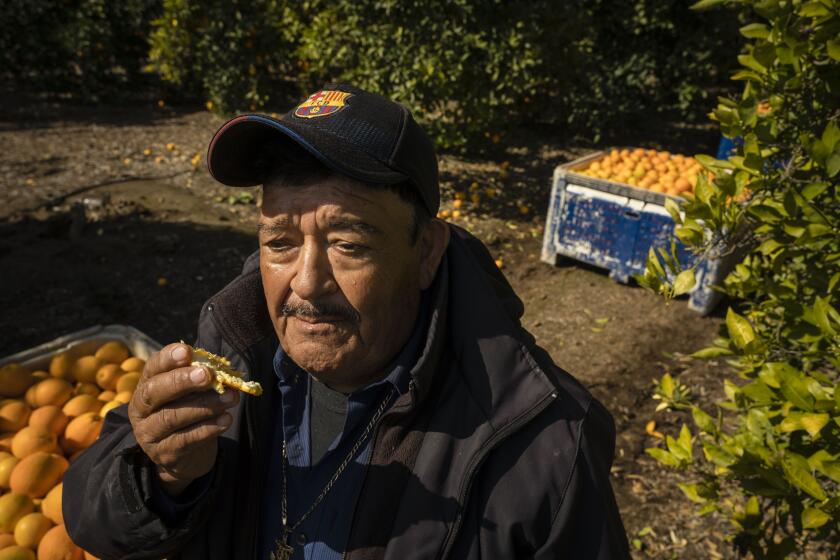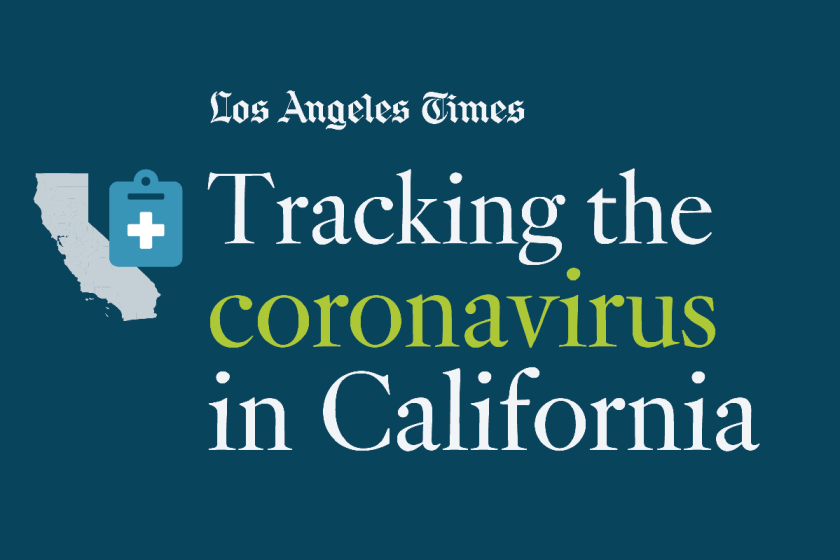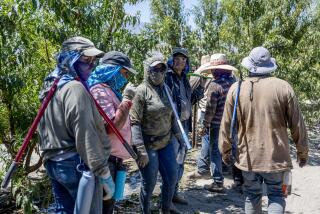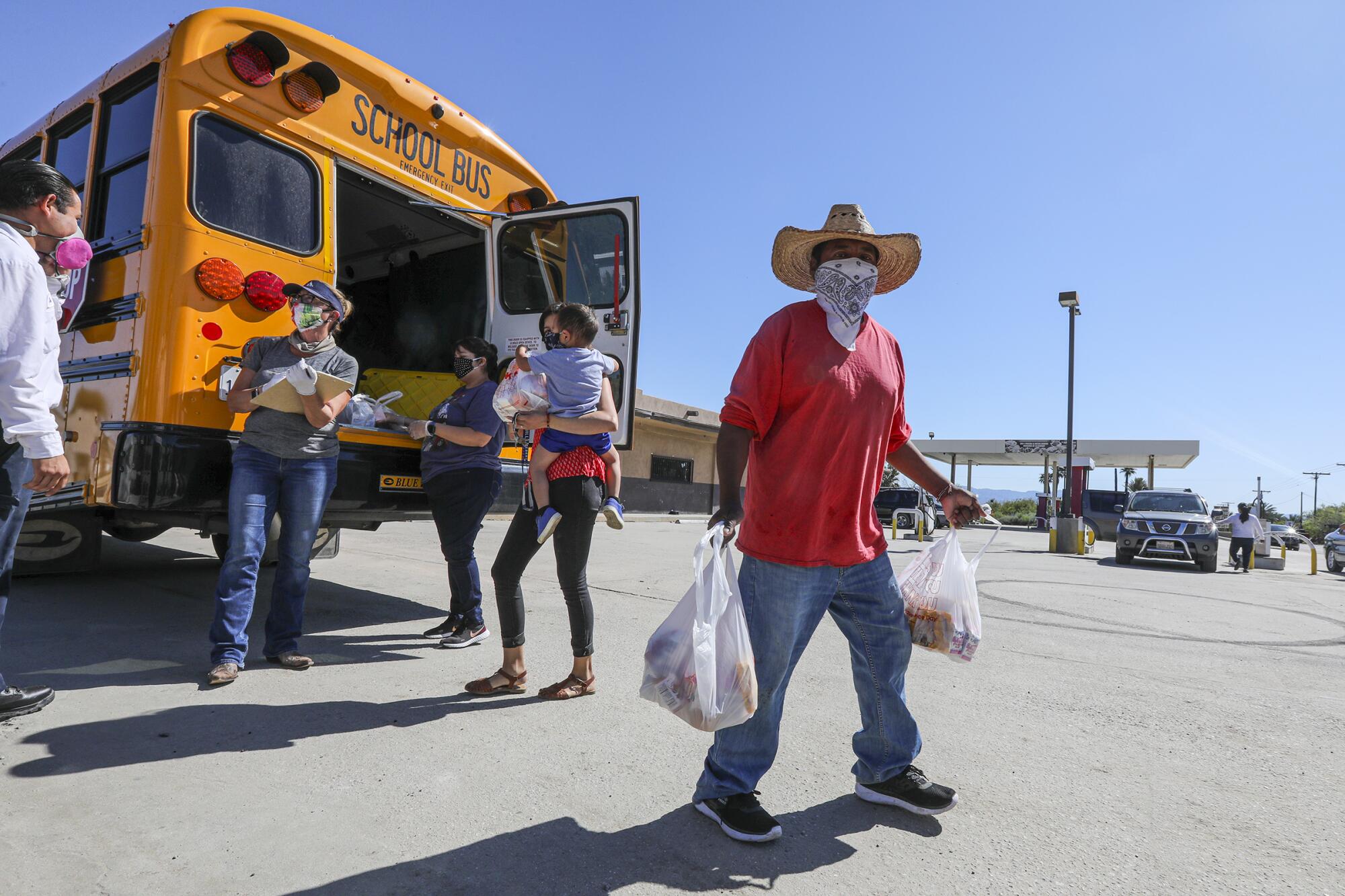
- Share via
THERMAL, Calif. — Even before the coronavirus struck, the Oasis Mobile Home Park was like a patient with underlying health issues. Decrepit trailers. Piles of garbage. Arsenic in the water.
So when the outbreak swept through Southern California, the patient didn’t stand a chance.
The owner of the park in Thermal was supposed to provide bottled water for the 1,900 residents to drink and cook with. But virus-fueled panic buying made the precious commodity hard to find.
So were farmworking jobs, as agricultural employers cut the size of their crews in an effort to keep workers a safe distance apart and because of decreased demand for produce.
California’s 420,000 farmworkers are working through the crisis. But language barriers and a lack of communication on the coronavirus put many at risk.
Throughout the eastern Coachella Valley, the coronavirus pandemic has only amplified the daily struggle for the overwhelmingly immigrant and working-class people who call this place home. Farmworkers are losing their jobs. The demand for food assistance has nearly tripled.
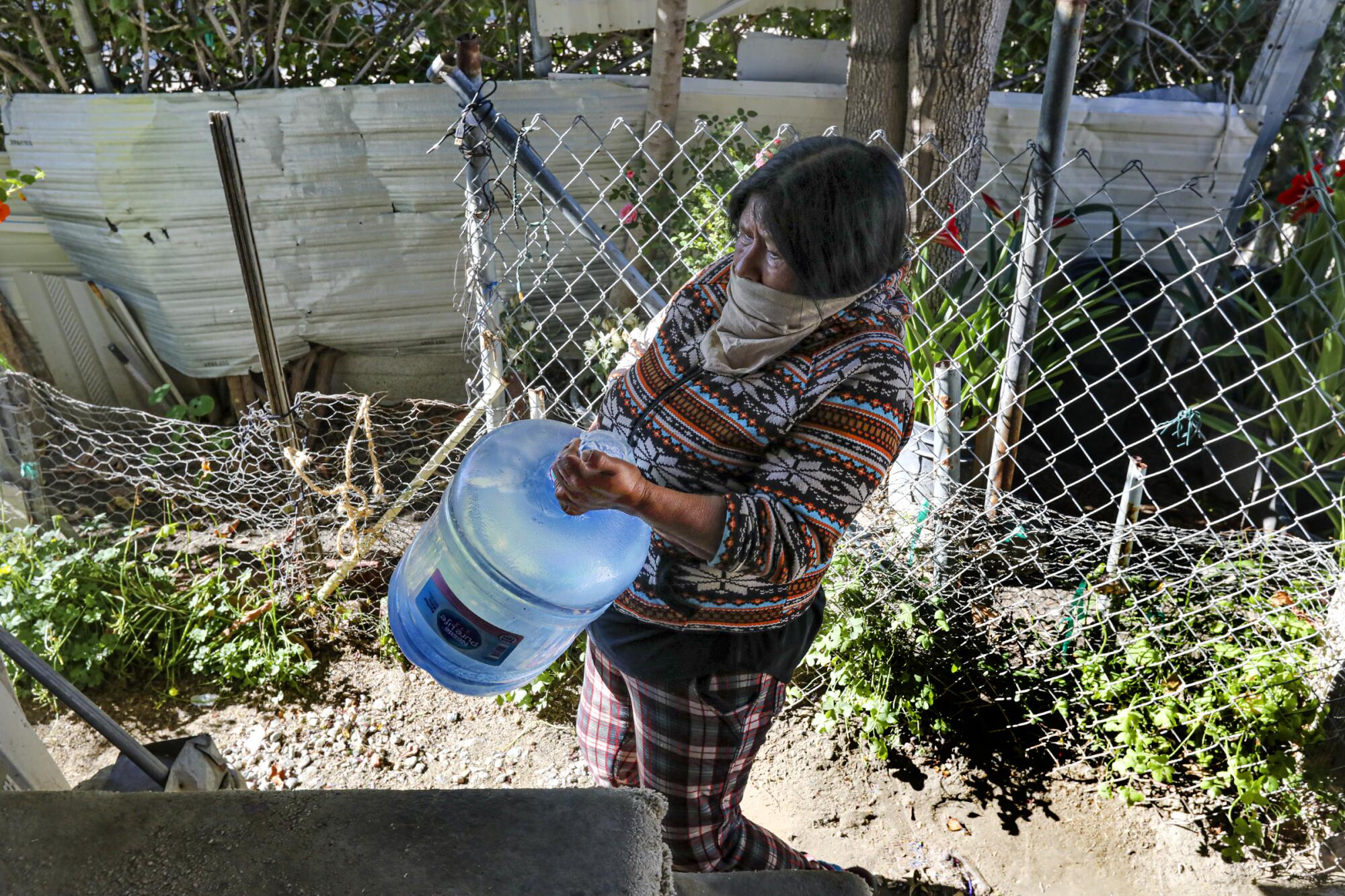
Esperanza Sanchez’s last paycheck — a little more than $100 for harvesting onions a month ago — won’t cover her $575 rent, let alone leave anything to live on. In April, she decided she had no choice but to not pay the rent.
“How am I going to do it?” the 61-year-old asked. A tear trickled down her careworn face, dampening the faded bandanna she wore for protection from the virus.
On Monday morning, the pajama-clad Sanchez pushed a five-gallon water bottle in a pink Minnie Mouse stroller from a water tender on 70th Avenue to her home in the Oasis Mobile Home Park, where she’s lived for the past 22 years.
She would use it to bathe her granddaughter and to make masa for tortillas.
The latest maps and charts on the spread of COVID-19 in California.
It was clean — poison-free — unlike what flows from the taps in her peeling red-and-white trailer, which sits on Torres Martinez tribal land. Last year, the U.S. Environmental Protection Agency found arsenic contamination at up to 10 times the allowable limit in the water residents had been using.
Although the park is not connected to the Coachella Valley Water District, the district has temporarily placed a water tender near the mobile homes, funded through non-rate revenue.
It’s a small way to help the farmworkers who live here, many of whom — like others across the state — are undocumented, lack health insurance and don’t qualify for unemployment insurance or federal COVID-19 relief.
“You think that would be bad enough,” said Castulo Estrada, vice president of the board of the CVWD, “but these folks on a daily basis have to come and live in an area where they can’t even have access to clean water.”
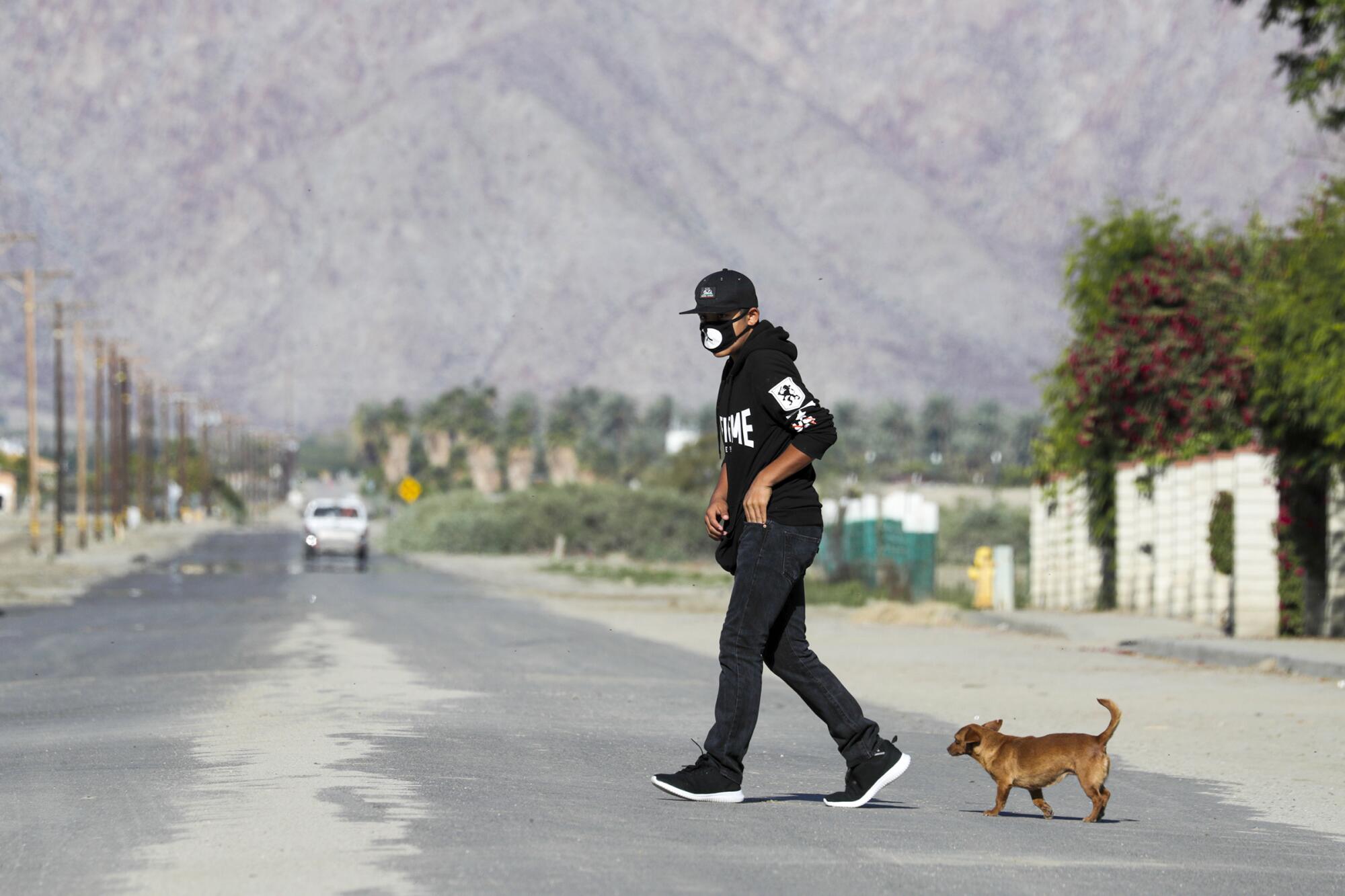
In normal times, Sanchez would have been out before 6 a.m., heading to work in the nearby Thermal fields. Instead, she wheeled the stroller — squeaking under its water weight — down the dirt road leading home, navigating around feces left behind by stray dogs that roam the park.
Like Sanchez, other residents were home on a day they should have been working.
Gabriela Reynaga, who was raised in this mobile home park, ushered her three children past La Chicanita Market and across the street to catch a bus to Indio. She’s been working two days a week, if that, cutting vegetables that are sent to New York. But everything is closed, she said, which means less produce and fewer jobs.
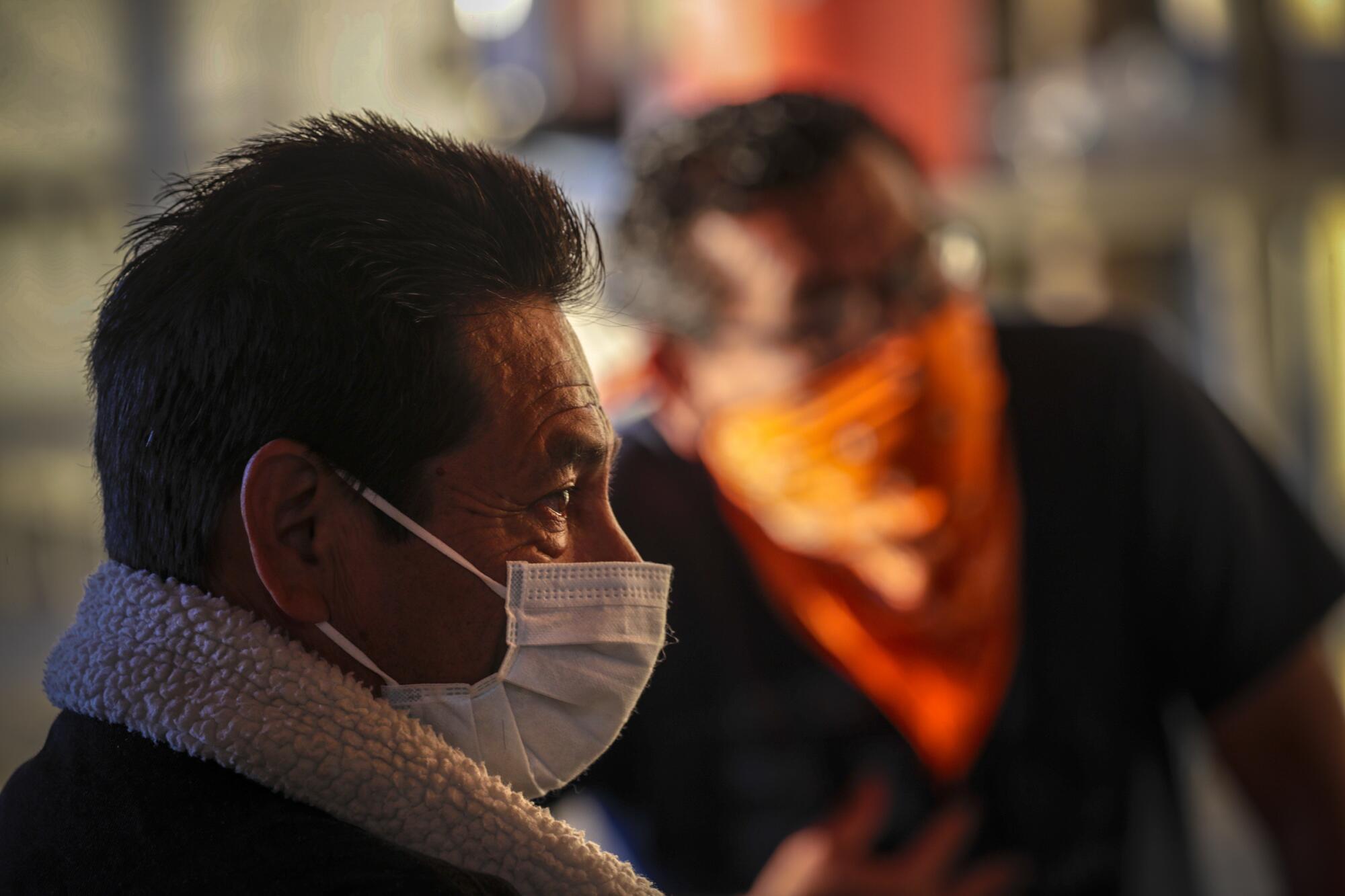
Mobile service isn’t great, so her 11-year-old, 13-year-old and 17-year-old struggle to do their homework. Even before the coronavirus outbreak, money to pay for internet access was scarce; now, with no income, being able to pay to keep her children connected to the outside world has become even harder.
Farmworkers in California make $26,000 a year, on average, according to the U.S. Bureau of Labor Statistics. In the farmworker communities of Mecca, Thermal, Oasis and North Shore, more than a third live below the poverty line, according to census data.
In Mecca, the nonprofit Galilee Center has long provided food, clothing and basic needs for families, including farmworkers. In the last month, the center has seen a tremendous increase in demand.
The number of those turning up on Thursdays for the center’s food drive has jumped from about 250 to 700. On a recent week, the line of cars stretched for at least three miles.
“It was too many people,” said Gloria Gomez, co-founder of the Galilee Center. “We had to stop at one point; we couldn’t do it anymore.”
Last Friday, staff took 60 meals to Oasis Mobile Home Park. In less than 10 minutes, the meals were gone.
The demand for goods needed by seniors, like Depend undergarments and Ensure nutritional drinks, has jumped 50%, Gomez said. Meanwhile, she said, typically only a handful of people each month apply for rental assistance; two weeks into April, the organization had received 30 applications.
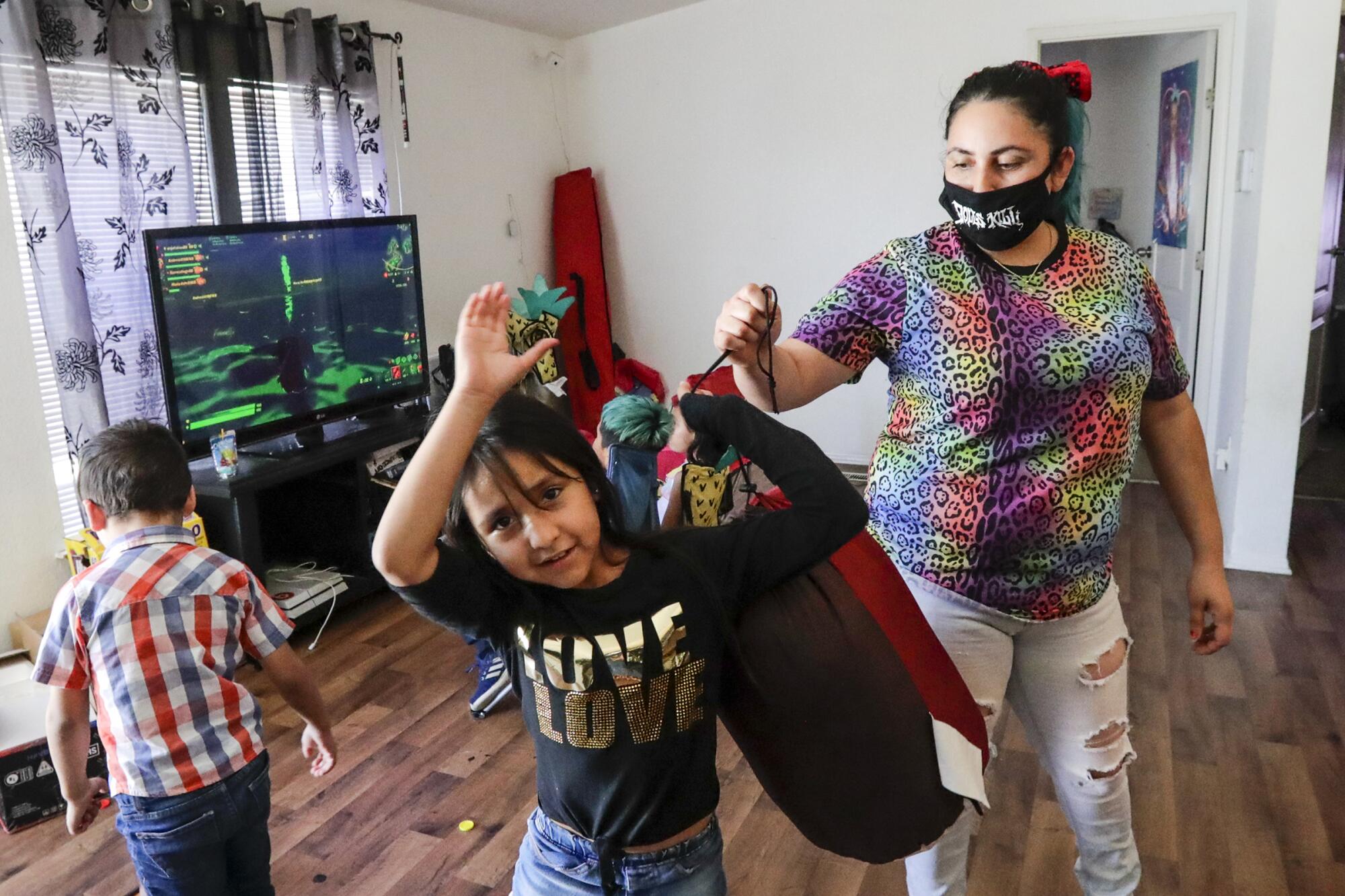
With that help, Maria Corrales was able to pay rent on her Mecca home. Since 2018, the single mother had worked in a date-packing house starting at 6 a.m. and finishing in time to pick up her three children from school in the afternoon.
Then, the schools closed because of the pandemic. She put her 12-year-old, 9-year-old and 7-year-old in daycare, but on March 16, that closed too.
Because of the situation with COVID-19, the daycare owner said in a letter, the facility would not open “until the health sector indicates the community is safe.”
“Sorry for any inconvenience,” the letter stated.
Corrales didn’t want to leave her children alone at home, so she made the difficult decision to stop working. Her last paycheck totaled about $185 for two days of work.
She knows the same is happening to others across the area. Before, not everyone would go for food distributions, but now there are lines everywhere. Her family has waited three and a half hours at a church for food.
Of Corrales’ five siblings living in the area, only one is still working, although with only a couple of construction jobs per week.
Another brother, a foreman in the chile fields, told Corrales the harvest would begin soon, but he’d been instructed to recruit fewer workers than usual in order to maintain social distancing.
“There’s not going to be a lot of work,” Corrales said.
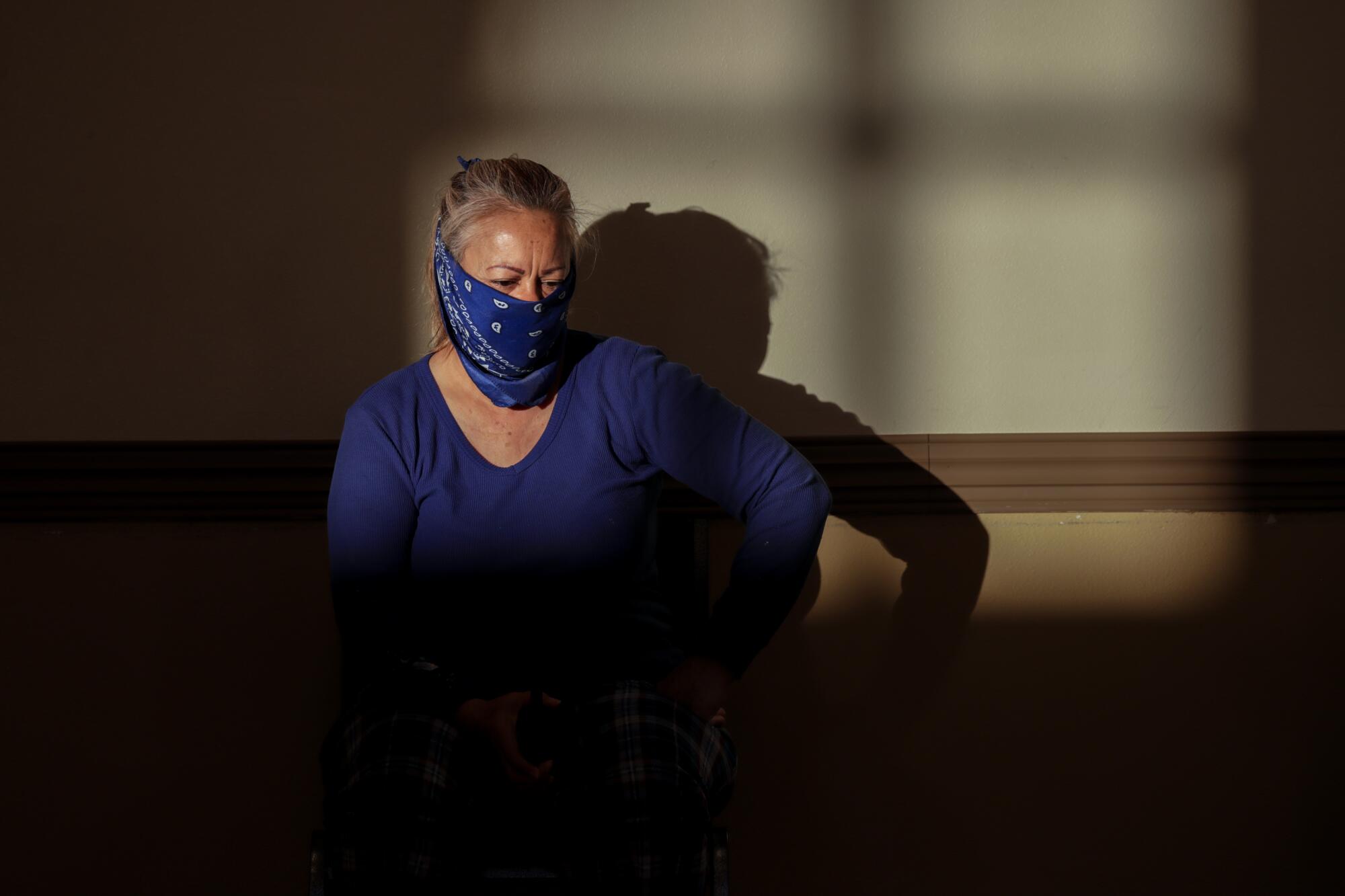
At the Our Lady of Guadalupe Shelter, which is run by the Galilee Center, Maria Canales took out the trash on a recent morning, the blue bandanna around her face billowing with each exhale.
A farmworker, Canales had planned to leave for Northern California earlier this year for work, but there was a lot of “sickness” there. Scared, the 66-year-old decided to stay, knowing she’s at high risk if she contracts the coronavirus.
She has kept busy at the Mecca shelter as she waits to hear about work. But every time she calls, a foreman tells her, “We’re full.”
Because of the lack of work, the shelter waived its $3 daily fee and allowed farmworkers to stay there throughout the day for their protection. Staff log their temperatures and keep their sleeping cots a safe distance apart.
They’ve only once had to use the gray, makeshift isolation room, for a farmworker who was coughing.
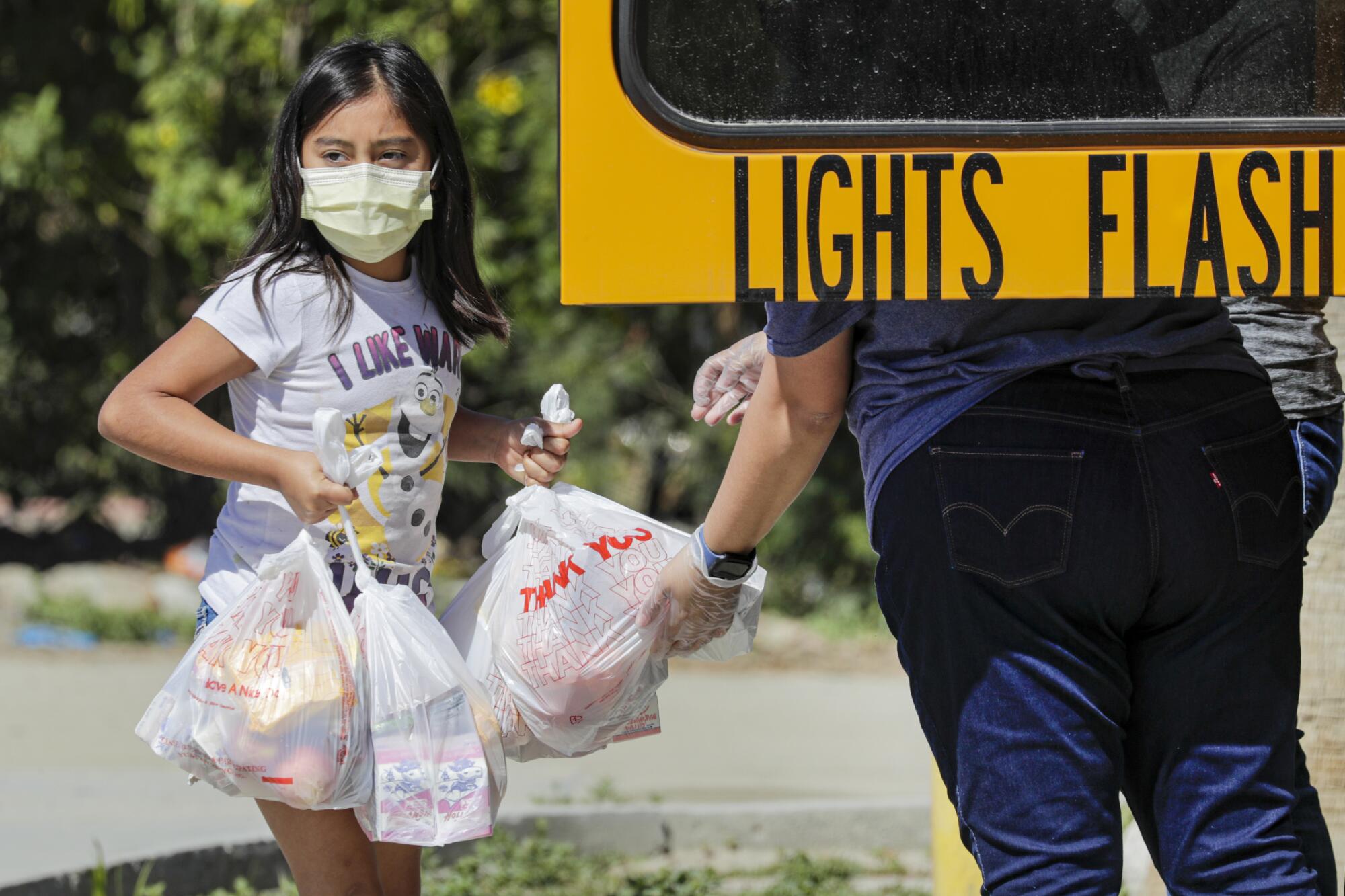
Canales has watched as other farmworkers in the shelter returned to Mexico, either tired of waiting or scared off by the virus. Those who stayed hadn’t worked in at least a month, passing the time playing cards, listening to music and swapping stories, their voices muffled by masks.
Often, they worry about family back in Mexico, who are waiting on financial support as they also shelter in place.
The same is happening across California. In some cases, farmers have been destroying their crops because distributors are not buying amid closures. As a result, farmworkers are being laid off early.
“We’re going to stay here until we work,” said Javier Gonzalez, as he sat with three other men outside the shelter, careful to keep a distance between their bodies. The 47-year-old has four kids in Mexico to think about.
“We need to make money.”
At the Oasis Mobile Home Park, the desert heat weighed heavily, like a blanket. A slight breeze provided almost no relief but kicked up dust along the dirt roads and rippled the skirts, jeans and shirts strung up on clotheslines in front yards.
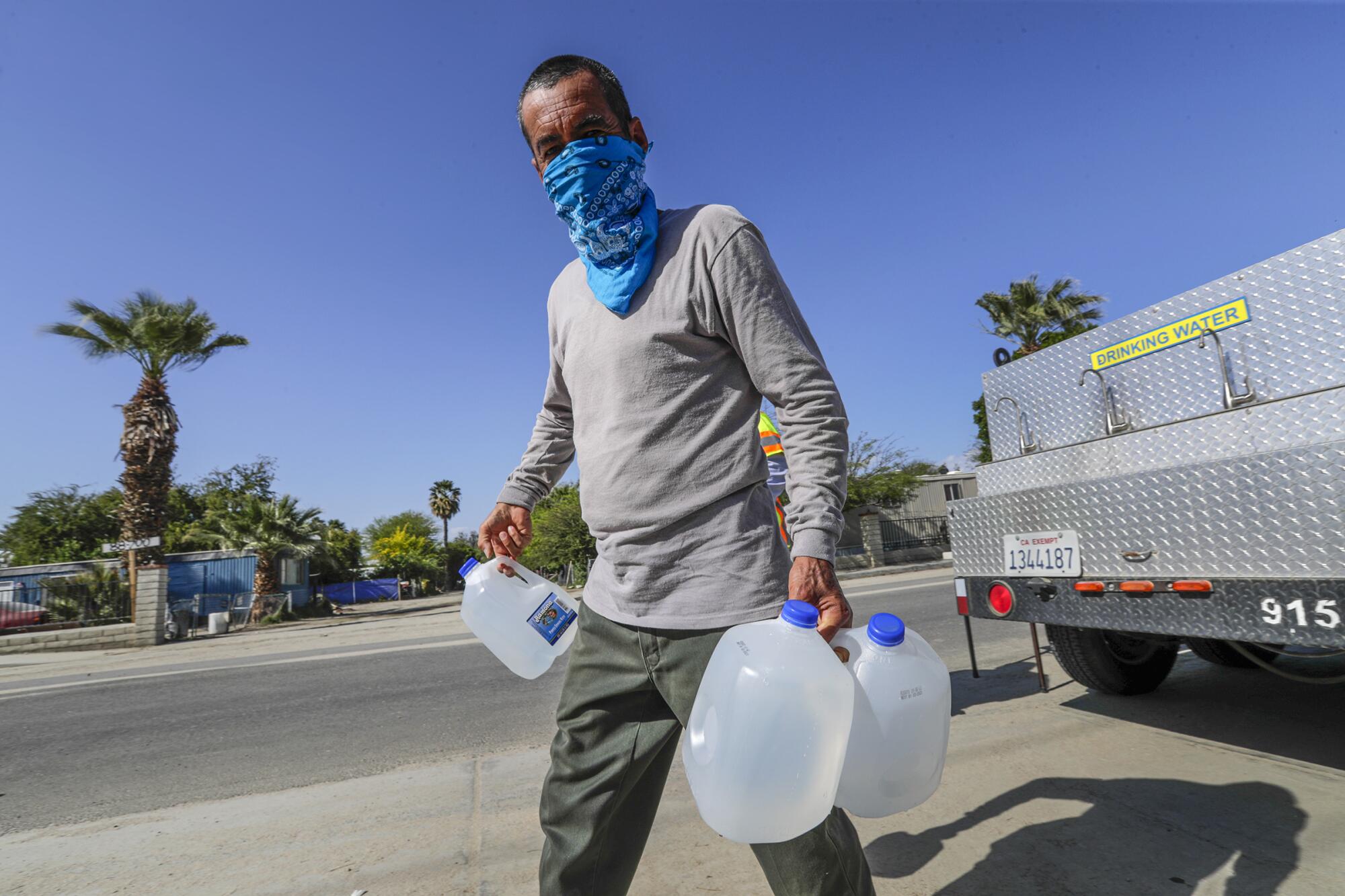
Mexican singer-songwriter Junior H’s lyrics filtered out from a mobile home tucked behind a chain-link fence.
Sanchez sat on her ramshackle porch, beneath a “Happy Birthday” Minnie Mouse sign and more than a dozen pink balloons. The family had celebrated Elida Paz turning 1 year old with a piñata and a small cake.
It had already been a tough year for the family, she said, as she leaned her small frame against her trailer. A month ago, Sanchez’s husband died of a brain bleed. Now, she struggled to find work, and her children worry about her going out because of the risk.
With Gov. Gavin Newsom’s recent announcement of a $125-million relief effort to help Californians without legal immigration status, Sanchez hoped her burden would lighten.
But if nothing changed, Sanchez said, they would do what they have always done: keep fighting.
More to Read
Sign up for Essential California
The most important California stories and recommendations in your inbox every morning.
You may occasionally receive promotional content from the Los Angeles Times.

